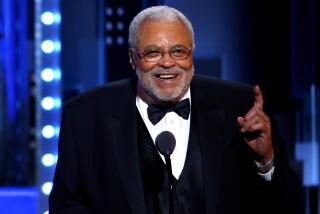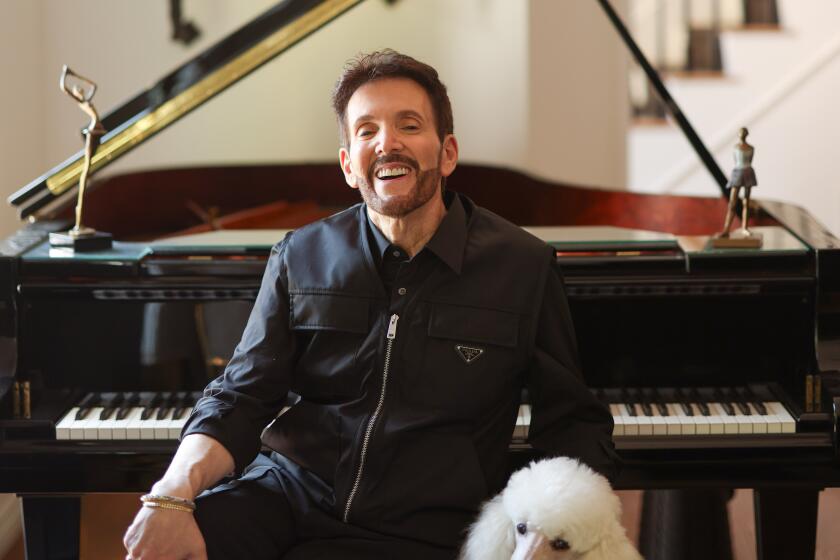THE ELLROY ENIGMA
One day in the mid-’90s, the lanky and sometimes manic James Ellroy walked into the brownstone New York office of his publisher, Otto Penzler -- the two were going to a fight that night -- and broke the news: He had just sold the film rights to his novel “L.A. Confidential.”
“We were laughing so hard we were crying,” recalls Penzler, who had published Ellroy on his Mysterious Press. “I was incredulous -- we both agreed it was unfilmable.”
They were right, of course. And they were also wrong. The 1997 Curtis Hanson film of “L.A. Confidential” became an enormous critical hit (if only a moderate success at the box office). It also won two Oscars; one for Kim Basinger for supporting actress and another for Hanson and Brian Helgeland for adapted screenplay.
Only the most die-hard Ellroy fan resented that the film resembled his labyrinthine novel -- with its dozens of characters, thick historical context and overlapping subplots -- only slightly. It’s considered one of the finest films of the ‘90s and one of the greatest film noirs since the genre’s 1950s heyday.
But since then, when it comes to movies, it’s been more crying than laughing for Ellroy fans.
Friday marks the arrival of Ellroy’s first produced screenplay: “Street Kings,” a racially charged tale of police corruption and conspiracy starring Keanu Reeves and Forest Whitaker. While the film, set in contemporary Los Angeles, lacks the sweep of “L.A. Confidential” and is unlikely to make the same impact, its language, characters, sardonic morality and fast-reversing plot feel like an Ellroy novel.
Ellroy himself, who was once quite critical of the films made of his novels, refused to discuss “Street Kings.” But when the novelist -- on a 2006 press tour for director Brian De Palma’s cinematic version of his “The Black Dahlia” -- was pressed by a Seattle Post-Intelligencer reporter about that film, he replied with, “Look, you’re not going to get me to say anything negative about the movie, so you might as well give up.”
Hardly a vote of confidence for either film. It makes you wonder: Why can’t Hollywood and the most celebrated crime writer of our time get along?
While most remember only “L.A. Confidential” and “Black Dahlia,” Ellroy’s writings have provided material for movies for 20 years, including “Cop,” a 1988 James Woods-starring version of “Fire on the Moon,” which Penzler called “unbelievably awful”; the 1998 bomb “Brown’s Requiem”; and 2002’s box-office disappointment “Dark Blue,” which starred Kurt Russell.
And then there were the what-might-have-beens, such as the long-brewing, never-realized David Fincher-directed “Black Dahlia” or Universal’s George Clooney-starring “White Jazz,” a movie based on the well-regarded conclusion to Ellroy’s “L.A. Quartet” of novels that stalled after the actor dropped out of the project over scheduling conflicts. .
“Street Kings” itself moved through several major directors -- Spike Lee, Oliver Stone -- before writer-director David Ayer, who wrote the script for 2001’s “Training Day,” took over its direction.
Nevertheless, the word “unfilmable” comes up a lot when people talk about Ellroy’s work.
Penzler, who edited and published six of the first eight Ellroy novels, loves the books but thinks their density makes most impossible fits for the screen. “They’re much too complex, with multiple plots that are interwoven,” he said. Some of the books are “more like ‘War and Peace’ than a typical crime novel. And there are layers and layers of these guys’ personalities.”
L.A.’s deep background
The other great aspect of Ellroy’s writing, he said, is his attempt, especially with the “L.A. Quartet” (which includes “Black Dahlia,” “The Big Nowhere” and “L.A. Confidential”), to capture the city’s historical background, racial fissures, and tension within and between the Los Angeles Police Department and City Hall: “How do you put that into a movie without it being all about that?” Penzler asked.
Joe Carnahan, the director who is seeking a new home for his “White Jazz” adaptation, thinks Ellroy’s books are too “out there” for mainstream Hollywood -- too violent and sadistic, too obsessed with seediness and corruption, and not nostalgic like most films set in the past.
“They’re subversive,” he said. “And James deals with really overt sexual perversion -- these things are taboo for a reason.”
Penzler contrasts Ellroy’s difficulties with Elmore Leonard, who has seen popular success with “Get Shorty,” critical success with “Out of Sight,” and several other winning adaptations such as “Jackie Brown” and “3:10 to Yuma.”
The writers’ styles, of course, could not be more different. Leonard, Penzler said, is “lean, lean, lean,” with pithy dialogue and straightforward plots that transfer right to the screen, “while Ellroy is big and robust” and almost unfathomably layered.
And then there’s Ellroy’s dialogue, with its heightened pastiche of jazz slang, cop patois, creative profanity and drug vernacular. His distinctive language (“The fruit sweating a sodomy beef snitched,” goes a typical metaphor-stuffed line in “White Jazz”) often works on the page, but in the more naturalistic medium of film, it can seem strained, especially in the mouths of young actors.
“James loves that snap, the pop of it,” said Carnahan. “That’s the danger of Ellroy: In the wrong hands it slides into camp, because it’s so wonderfully overwrought.”
Even Scarlett Johansson, who played ‘40s vamp Kay Lake in “Black Dahlia,” talked about how difficult his words were to put across. “As a modern actor, we made this movement that started in the 1970s,” she told Voice of America News. “Realism and the gritty kind of natural technique. It was interesting to pair that with the dialogue so stylized and impossibly unrealistic, saying things like, ‘How could you, Dwight, how could you?’ We never say those things. That kind of dialogue is so dated.”
Cop talk
Some challenge the idea that Ellroy’s writing, whether novels or scripts, is tough to translate to the big screen. “He’s strong on character, strong with dialogue and strong with plot,” director Ayer of “Street Kings” said of the three keys to making a movie work. (Ellroy shares a screenplay credit on “Kings” with Kurt Wimmer and Jamie Moss.)
The essence of Ellroy’s writing, to Ayer, is “his incredible empathy for the cop as a broken man: He realizes that policing takes a psychic toll. He sees that they’re a subculture apart; he understands their tribal rituals.”
Ayer, who wrote the screenplay for “Dark Blue,” thinks Ellroy’s dialogue is a plus, not a minus, and resembles the way cops really talk. “I worked hard to preserve that element,” he said. “Police vernacular is a little anachronistic, there’s something old-school about it. It sounds heightened to the layman, but if you run it by a cop they’ll say, ‘That’s it.’ Everything becomes shorthand for a cop.”
Joseph Wambaugh, the veteran novelist and screenwriter, concedes that Ellroy’s novels are dense and baroque but points out that “a good director can work through that” the same way Hanson did. “Any one of his books could be as good [a film] as ‘L.A. Confidential.’ ”
The director needs to really connect with an author’s vision, he said, something that’s happened rarely with Ellroy but occurred at least a few times with films of Raymond Chandler and James M. Cain novels and more recently with Dennis Lehane’s “Mystic River” and “Gone Baby Gone.”
“So it can be done by being faithful, and it can be done by paring away the stuff that allows you to make a two-hour movie,” said Wambaugh, whose latest novel, “Hollywood Crows,” recently hit bookstores. What it takes is “the right director, the right screenwriter -- both of them understanding what’s essential and what’s not.”
Unfulfilled film potential
What’s disheartening to readers and film audiences is that Ellroy offers something almost unmatched in contemporary crime-writing. He’s not universally loved -- doubters consider him Mickey Spillane with pretensions -- but Ellroy stands out as one of the genre’s best because he’s the noir version of history-plumbing novelists such as Don DeLillo or E.L. Doctorow, and the obsessively detailed world sketched in his “L.A. Quartet” is a veritable parallel universe.
Despite his current reticence, Ellroy has made stray comments about the film world over the years. It’s easy to see past the polite answers, as when he praised De Palma’s “beautiful, visual record of my book, my story, my characters” in “The Black Dahlia.”
More telling is the way Ellroy described Hollywood to the Chicago Tribune’s Michael Phillips as a longtime “magnet for psychically maimed misfits running away from something.” Does he retain an affection for the place and its people? Hard to imagine.
Any mystery as to why Ellroy hasn’t played well with Hollywood should probably end when friends start discussing integrity. Wambaugh said that despite the wild-man persona, the key to Ellroy is his strong sense of right and wrong: “He’s extremely moral. James will turn down money at the drop of a hat, offered to him by filmmakers and publishers, if he thinks it’s going to compromise his work. He’s an extremely straightforward, stand-up guy.”
And then there’s the answer he gave actress Dana Delany in Interview magazine in 2006, in which Ellroy proved to be more prescient than he could have guessed.
“I’m happy for the money. I’m happy for the exposure,” he said after she asked how he felt about his novels being made into movies. “Every once in a while there’s lightning in a bottle like with ‘L.A. Confidential,’ so we’ll see what happens with ‘The Black Dahlia.’ Even bad movies create substantial readership for your books.”
--
More to Read
Only good movies
Get the Indie Focus newsletter, Mark Olsen's weekly guide to the world of cinema.
You may occasionally receive promotional content from the Los Angeles Times.










